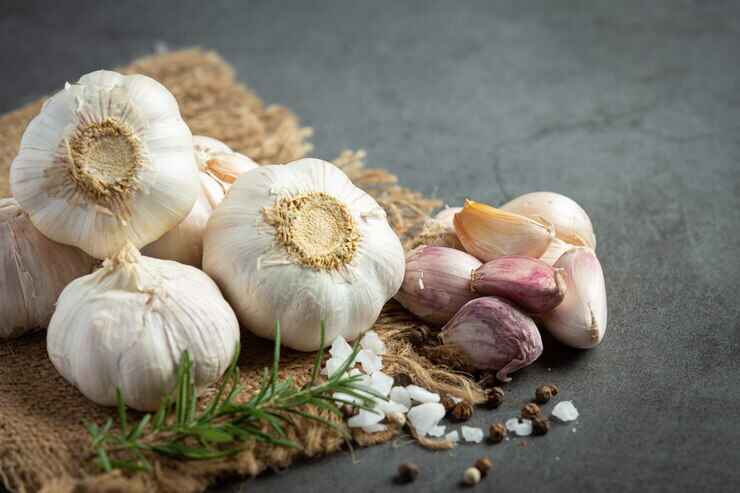What Happens If You Eat Garlic Everyday

Garlic, a humble kitchen staple, has transcended its culinary use to become recognized as a potent health enhancer. Loved for its distinctive taste and aroma, garlic also packs a powerhouse of benefits when included in the daily diet. In this article, we will explore the myriad of effects, both positive and negative, that daily garlic consumption can have on your health.
I. Introduction
Garlic has been used both as food and medicine for thousands of years, dating back to ancient Egypt. The bulb’s usage spans numerous cultures and cuisines, making it a truly global ingredient. But what happens when you make garlic a daily part of your diet?
II. Nutritional Profile of Garlic
Garlic is low in calories but rich in essential nutrients. A single clove of garlic contains manganese, vitamin C, selenium, and small amounts of fiber, calcium, copper, potassium, phosphorus, iron, and vitamin B1. This makes garlic an excellent addition to any diet from a nutritional standpoint.
III. Health Benefits of Regular Garlic Consumption
A. Boosting the Immune System
Consuming garlic daily can strengthen the immune system due to its allicin content, known for fighting bacteria and infection.
B. Cardiovascular Health Improvements
Regular garlic intake has been shown to help control hypertension and reduce cholesterol levels, thereby lowering the risk of heart disease.
C. Anticancer Properties
Studies suggest that garlic can play a role in cancer prevention, especially cancers related to the digestive system.
D. Antimicrobial Effects
Its natural antimicrobial properties make garlic a great dietary addition for protecting against various infections.
IV. Potential Side Effects of Daily Garlic Consumption
While beneficial, too much garlic can also lead to several side effects.
A. Digestive Issues

Ingesting a lot of garlic can irritate the digestive tract, leading to discomfort.
B. Odor Problems
The distinct odor can be unpleasant and persistent when consumed in large quantities.
C. Increased Risk of Bleeding
Garlic’s anticoagulant properties, while generally beneficial, can increase bleeding risk if consumed excessively.
D. Drug Interactions
It’s important to consider garlic’s interactions with other medications, particularly blood thinners.
V. Garlic and its Impact on Skin Health
While garlic helps combat bacterial infections, which could be beneficial for acne, excessive consumption can lead to skin irritation and rashes.
VI. Garlic in Different Diets
A. Keto Diet
Garilla is excellent for ketogenic diets due to its low carbohydrate content.
B. Vegan Diet
It provides essential nutrients often missing in vegan diets.
C. Mediterranean Diet
Garlic is a staple in Mediterranean cuisine, aligns with this diet’s heart-healthy approach.
VII. Ways to Incorporate Garlic into Your Diet
A. Raw Garlic Uses
Consuming garlic raw maximizes its nutritional benefits, though it’s more potent in flavor.
B. Cooking with Garlic
It enhances flavor while maintaining many of its health benefits.
C. Supplements and Extracts
For those who cannot tolerate fresh garlic, supplements are an excellent alternative.
VIII. Precautions and Best Practices
While garlic is generally safe for most people, those with allergies or specific health conditions should consult their doctor before including it in their diet regularly.
IX. The Best Time to Consume Garlic
Morning consumption of garlic on an empty stomach is often recommended for best absorption and maximal effect.
X. Comparison with Other Superfoods
A. Garlic vs. Ginger
Both have anti-inflammatory properties, but garlic is better for heart health and cholesterol.
B. Garlic vs. Turmeric
While turmeric is excellent for inflammation and joint health, garlic offers more cardiovascular benefits.
XI. The Economic Aspect of Consuming Garlic
Adding garlic to your diet is economically friendly, requiring minimal investment for significant health returns.
XII. Cultural Significance of Garlic
A. Historical Use
Garlic has been revered in many cultures for its medicinal properties, making it a staple in traditional remedies.
B. Contemporary Usage
Today, garlic is celebrated not just for its flavor but also for its health benefits in various cultural cuisines.
XIII. Misconceptions about Garlic
Common myths include the belief that garlic can cure the common cold or that it acts as a mosquito repellent. While beneficial, it does not possess these miraculous powers.
XIV. Expert Opinions on Garlic Consumption
Health professionals universally praise garlic for its health benefits, agreeing on its positive impact when consumed appropriately.
XV. Conclusion
Eating garlic daily can offer numerous health benefits, from enhanced immunity to reduced risk of chronic diseases. Incorporating garlic into your diet, while monitoring for any adverse effects, could greatly improve your overall health.
FAQs
What are the health benefits of eating garlic daily?
Eating garlic daily can boost your immune system, reduce blood pressure, improve cholesterol levels, and provide antioxidant benefits. It’s also known for its anti-inflammatory and antimicrobial properties.
Can eating garlic daily improve heart health?
Yes, garlic can improve heart health by reducing high blood pressure, lowering LDL cholesterol levels, and preventing plaque buildup in arteries, thus reducing the risk of heart disease.
Are there any side effects of consuming garlic every day?
While garlic has many benefits, excessive consumption can cause bad breath, body odor, digestive issues like bloating and gas, and, in some cases, skin irritation or allergic reactions.
How much garlic should I eat daily for health benefits?
Consuming 1-2 cloves of raw garlic daily is generally recommended to reap health benefits. However, it is essential to start with a smaller amount to allow your body to adjust.
Can garlic interact with medications?
Yes, garlic can interact with certain medications, especially blood thinners and some types of antibiotics. It’s important to consult with a healthcare professional before adding large amounts of garlic to your diet if you are on medication.